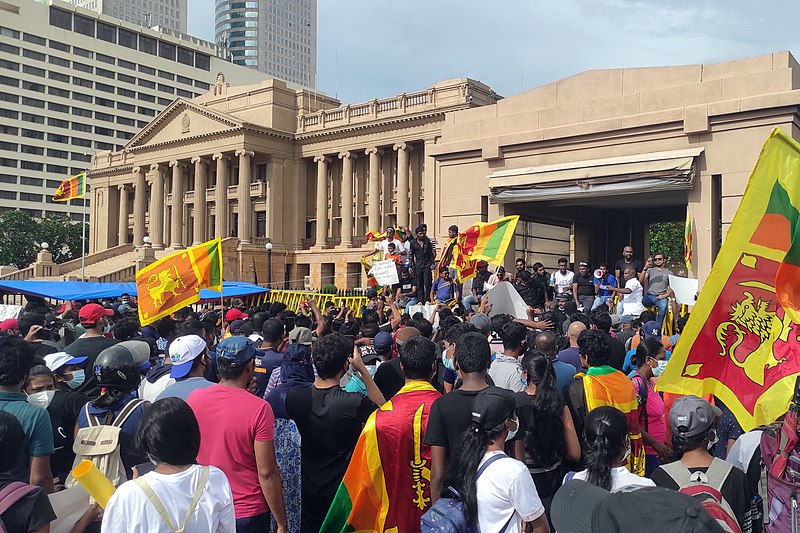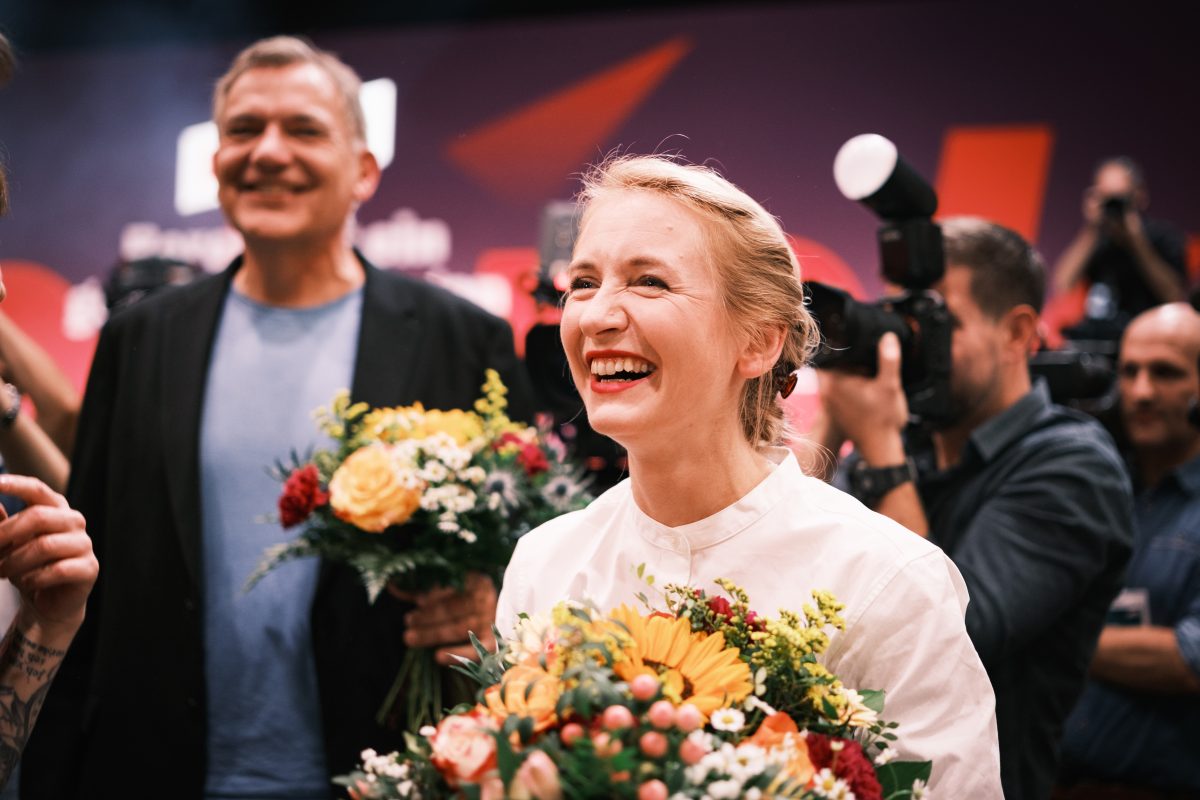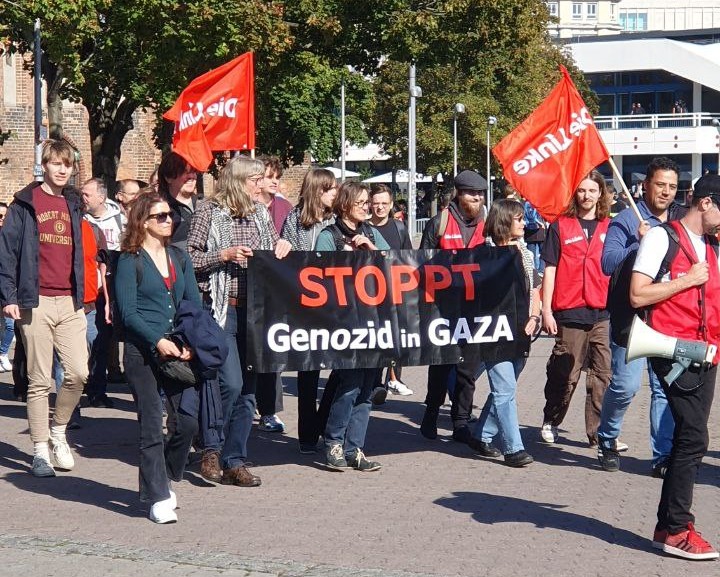Sri Lanka have recently been in the news for electing a “Marxist-Leninist” government. This has sparked a variety of reactions in international left circles, ranging from “prosperity is ahead for Sri Lanka” to “sounds sus, I need to read more about this”. I shall set out why being suspicious about this was the correct option.
First, some recent history: In 2021, Sri Lanka entered the worst economic crisis in the country’s independent history. This rapidly spiralled, leading to shortages in everything from paper to medicines to food. The crisis peaked in 2022, leading to the president at the time (Gotabaya Rajapaska) fleeing the country, as protestors burnt down his family home. Gotabaya and his brothers were particularly unsavoury characters. Their family dominated Sri Lankan politics through the “centre-left” Sri Lanka Freedom Party (SLFP) for decades. In 2015, the Rajapaksa Bros. were purged from the party. Their loyalists, had moved further and further to the right. They formed a splinter Sinhalese Buddhist chauvinist party (the SLPP), which won the 2019 elections. Following the events of 2022, a centre-right caretaker government (the UNP) was appointed. The UNP, too, had its own internal split in 2020, when their deputy leader Sajith Premadasa formed the SJB, pivoting towards a more centrist and socially progressive platform.
The elections last week featured a political surprise, when the JVP, an entirely unrelated “Marxist-Leninist” party won a three-way race between the JVP, the SJB, and the UNP. The JVP used to be rather revolutionary, having participated in multiple armed uprisings against the government in the 70s and the 80s. Their last insurrection failed to bring in the revolution, though it did lead to nearly 60,000 deaths. And while the JVP didn’t exactly hold back from murdering civilians, dissidents, and other kinds of leftists, almost half of these were JVP members, murdered by the government’s death squads. The end result was the JVP abandoning their revolutionary goals and joining mainstream politics instead.
To understand the implications of their victory, we must first examine the debt crisis itself. There are many compounding factors here: from the prosaic (COVID affecting tourism) to the absurd (the government banning the use of fertilisers and pesticides). Broadly, Sri Lanka’s debt crisis is symptomatic of a wider trend in the global South. The underlying reason is the US/UK/EU’s collective response to the 2008 crisis, the grand shitshow better known as quantitative easing. The resulting zero-interest rate period and immense liquidity in US dollars, led to a glorious decade of capital looking for the best scams it could find all over the world, in the hopes of the highest yields. Institutional investors flooded the world looking for cheap returns. In the global North, this brought us NFTs and podcast bros; in the South, it led to rapidly growing sovereign debt crises. The lack of capital controls in global South countries meant that money would leave as quickly as it had entered. Once borrowing rates spiked, the smaller amongst these were saddled with debt that they could not possibly service, owed to mostly Western corporations. More than half of Sri Lankan bilateral debt was Chinese; but most Sri Lankan debt was not to foreign governments, but to the private sector. Enter the IMF, with a sack full of bailouts with all the usual conditions. Cut down on public spending, on education and healthcare; sell unprofitable state-owned enterprises; or basically, get fucked. The end result? Greece; Argentina; Egypt; and Sri Lanka.
So how “Marxist” are the JVP anyway? What does it even mean to be Marxist in an island nation the size of Sri Lanka? The JVP are not going to pivot Sri Lanka away from value-form, or from the production of commodities rather than use-values. To do so given their geopolitical standing would be economic suicide. Socialism in one country has always been a bit of a pipe dream, but when the country is a small tropical island with the population of Moscow, the pipe dream turns into a joke. The JVP’s policies are social democratic at best: increased public spending, and a renegotiation of the IMF deal. Given that this might potentially be the best any party could do given the circumstances, surely we should be somewhat relieved?
The catch, because there has to be one, is the legacy of the Sri Lankan Civil War, and the ensuing genocide of the Sri Lankan Tamils.
Intermezzo: Civil War
The roots of Sri Lanka’s decades-long civil war, as with most postcolonial civil wars, date back to British colonialism. Sri Lanka is a diverse island, with many of its ethnic groups having inhabited the island for centuries if not millennia. These included the Sinhalese-speaking, Buddhist majority; a Tamil-speaking, mostly Hindu minority; the Moors (yes), a Muslim Tamil-speaking community; a separate Indian Tamil community, brought over as indentured workers by the British; and many other smaller groups, such as the indigenous Vedda people. British modernity—and its drive to explicitly and rigidly define identity, leading to the association of ethnic subjectivities with nationhood—led to a struggle for state power in British state institutions. Tamils at the time had better access to English-language education and were overrepresented in the civil service. Their demands for power-sharing after independence were rejected, and the Sinhalese majority instead proceeded to consolidate state power.
In and of itself, this would not have been terrible, had it led to an inclusive democracy. Yet one of the first steps that the independent Sri Lankan government took was to pass the Ceylon Citizenship Bill (1948), disenfranchising practically all Indian Tamils in Sri Lanka, rendering them stateless. In 1952, the government began sponsoring Sinhalese settler-colonialism in the Tamil-inhabited north of the country, leading to pogroms and ethnic cleansings of Tamil civilians. The Sinhala Only Act (1956) replaced English with Sinhalese as the main language of the country, with no legal recognition of Tamil, effectively leading to a purge of Tamils from state institutions (note that Sinhalese and Tamil are about as mutually intelligible as Hungarian and Romanian are, or Finnish and Swedish). When the Prime Minister at the time tried to water down the language act, he was promptly assassinated by an outraged Buddhist monk.
Continuous Sinhalese-Buddhist chauvinism led to the understandable rise of secessionism amongst the Tamil minority, who began to demand an independent state in the north of the island—Tamil Eelam. It rapidly birthed armed struggle, with the birth (amongst other groups) of the Liberation Tigers of Tamil Eelam. The (extremely violent) war broke out in 1983. The Sri Lankan military routinely massacred ethnic Tamils, participated in mass sexual violence, and carried out thousands of enforced disappearances, euphemistically called “white van abductions”. The Tigers responded in kind, carrying out revenge attacks, suicide bombings, and successful political assassinations. Say what you will about the Tigers, you cannot say they lacked ambition: their list of successful assassinations included the President of Sri Lanka, and the Prime Minister of India. But violence ultimately begets violence, and the Tigers were far from “clean”. They refused to shy away from murdering civilians; they enlisted child soldiers and carried out more than 83 suicide attacks over the course of the war; and they were exceptionally brutal towards rival Tamil factions. In 1990, they expelled all Muslims from Tamil Eelam, accusing them of collaborationism.
The war went on for 26 years, with multiple pauses for negotiations, occasionally under the aegis of the widely unpopular Indian Peace Keeping Force, who were rather prone to committing war crimes themselves. The final stages of the war, after the collapse of a Norwegian-mediated peace process, were marked by the Mullivaikkal massacre. The military, having evacuated Tamil civilians to a tiny strip of land designated as a no-fire zone, fired upon them with heavy artillery, killing as many as 140,000 civilians in a matter of months.
If all of this should remind you of current events, it is because there are undeniable parallels. The developing national consciousnesses under a modernity entirely unsuitable to existing social arrangements; the emergence of ethnic chauvinist “democracies”; state-sanctioned land-grabs for a chosen ethnicity; and the endless, inevitable cycles of violence that follow. The parallels between Mullivaikkal and Rafah are strikingly depressing, as is the knowledge that the Sri Lankan Armed Forces acquired weapons from the United States and Israel.
(while acknowledging these parallels, we must also remind ourselves that Sri Lanka can and should be analysed on its own terms)
—
Today, the Tigers have been defeated. The Sinhalese Buddhist identity is hegemonic across the island. The army generals that led the genocide are celebrated as war heroes; Tamil remembrances are banned. Every single Sri Lankan party was culpable in the genocide. This includes the “Marxist” JVP, who were often worse than other parties. After all, their first insurrection involved the racial profiling of Tamils as “fifth columns” for Indian imperialism; and their second was a response to the (inadequate) Indo-Sri Lankan accords that granted limited autonomy to the Tamils. More recently, the JVP were in government during the Asian Tsunami of 2004, when the peace process was ongoing. The government at the time agreed to work with the Tigers to help distribute food aid to the Tamil provinces, prompting a JVP withdrawal from the coalition. Little has changed since then. The leader of the party has promised not to hold those found guilty of human rights violations accountable. He has expressed support to maintain the Buddhist supremacist nature of the nation-state. He refuses to fully implement their constitution’s 13th Amendment promising increased devolution to provinces. And while talk is cheap, the SJB (who also happened to win all Tamil-majority districts) have taken a more conciliatory stance on many of these issues.
Sinhalese supremacist Marxists theoretically justify their positions by convincing themselves that all national minorities are reactionary fifth columns, or that devolution is reactionary identitarianism anyway. There is nothing new under the sun. We, as leftists, should not celebrate this any more than we would a Bündnis Sahra Wagenknecht win in Germany. We must have higher bars for political actors, beyond merely looking to see if they have the M-word in their party description. Broader Tamil demands today are extremely reasonable. This include implementing the 13th Amendment; independent international investigations into war crimes; justice for the families of the victims of the white van abductions; and resettlement of Tamils displaced during the war. By any yardstick, these are very uncontroversial demands.
At the end of the day, we must also bear in mind that Sri Lanka occupies a certain role in global relations. It isn’t that Sri Lanka is necessarily poor. Per capita, it is the wealthiest South Asian state, on par with Brazil prior to the crisis. But Sri Lanka is heavily indebted to Western corporations, backed by institutions able to wreck the country through sanctions if austerity demands are not met. This forces us into being slightly charitable towards Sri Lanka. There exists a genuine, wide, ethnic Sinhalese peasantry and working class. If the JVP are sincere about public spending, they will need to form alliances. This includes smaller nations in the global South in the same boat as Sri Lanka, as well as larger states that could act as counterweights to the IMF. Whether they are capable of doing so remains to be seen.
As for the rest of us, living in Europe—those of us who explain the rise of the far-right in Europe as a consequence of falling material conditions should ask ourselves one question. Precisely what do we expect will come of the very tenuous peace on the island, should its citizens be driven further and further into impoverishment?




